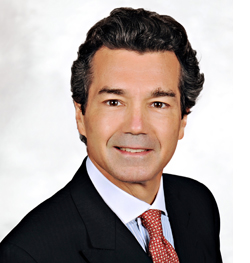2018-2019
By Mélanie Dugré, lawyer
(Article published on August 23, 2018)
 “The members of the Pratte family certainly do lack originality,” says Mtre Guy Pratte with a hint of a smile. Mtre Pratte, who will be receiving the Medal of The Bar of Montreal on September 6, said this to explain his decision to study law, referring to the many members of his immediate and extended family who have enjoyed brilliant careers as lawyers and judges.
“The members of the Pratte family certainly do lack originality,” says Mtre Guy Pratte with a hint of a smile. Mtre Pratte, who will be receiving the Medal of The Bar of Montreal on September 6, said this to explain his decision to study law, referring to the many members of his immediate and extended family who have enjoyed brilliant careers as lawyers and judges.
However, the legal universe he grew up in did not really influence his choice, as he had a natural inclination toward philosophy. After studying at Brébeuf, where, he admits, he could have taken the Nobel Prize for laziness, the Quebec City native applied to study philosophy at McGill University and Université de Montréal.
At the urging of his father, who was worried about his son’s lackadaisical attitude, he attended the University of Western Ontario in London before registering for a Master’s in philosophy at the University of Toronto.
A course on the philosophy of law taken in 1978 had a decisive impact on Mtre Pratte’s decision to study law in hopes of teaching or embarking on a career in the business world.
He was unprepared for how completely he would be captivated by pleading cases. Since then, litigation has been his burning passion, one that has remained with him since his admission to the Ontario Bar Association in 1984. He began his practice at Blakes in Toronto, and then joined the Ottawa firm of Scott & Aylen, where he presented a wide variety of cases before courts at every level.
In 2000, when the national firm of Borden Ladner Gervais was founded, his involvement in certain litigation cases before the Quebec courts – including a class-action suit against the tobacco companies – led him to take the examinations for admission to the Barreau du Québec in 2002.
Dividing his time between Toronto, Ottawa and Montreal, Mtre Pratte noted the different models and values that colour the legal communities in both provinces. Inspired by the pro bono movement, which is very strong in Ontario, he put forward the idea of creating a similar structure in Quebec, an idea that received the strong and essential support of several other members of the Barreau.
Mtre Pratte threw himself into his project and rallied a number of colleagues from major Montreal law firms and members of the judiciary. Pro Bono Québec came into being in 2008 and has been constantly growing, a sign of its relevance at a time when access to justice is a timely and important issue, now more than ever. It is on account of his role in creating Pro Bono Québec that the Bar of Montreal wishes to honour him with its highest distinction.
Access to justice is a cause dear to Mtre Pratte’s heart, a social problem he finds frustrating because people have talked about it for so long – Charles Dickens wrote about it as far back as 1850 – without being able to come up with a satisfactory solution.
Nevertheless, Mtre Pratte considers that it has been a privilege to work with complex and interesting cases that have fed his passion for pleading in the courtroom. Although he found it difficult to identify his most important cases, the Supreme Court’s recent decision in Trinity Western, in which he represented the Ontario Bar Association, was an important case in constitutional law and for the values put forward by the Bar. In the case in question, Trinity Western Christian University wanted to set up a law faculty that would not accept homosexuals, among others. However, the Supreme Court upheld the Ontario Bar Association’s right to refuse to accredit this law faculty.
Mtre Pratte also mentioned his work on commissions of inquiry, particularly those involving Jean Pelletier and Brian Mulroney. In passing, he had a few things to say about these commissions, which in his opinion constitute powerful tools that need to be handled with great care, because of their potential to ruin careers and lives.
He has been the president of Pro Bono Ontario for the past two years and also teaches law, which he considers like another form of argument and defence. He is also a member of various boards of directors and involved in a range of social issues. Very sensitive to the issue of mental health, he sat on the board of the Centre for Addiction and Mental Health Foundation. He appreciates the Bar of Montreal’s initiative with the EN-TÊTE campaign, and expresses the hope that major law firms will increasingly speak out about mental health-related issues.
Questioned about his plans and his projects, Mtre Pratte does not believe that he has accomplished all his goals just yet, and is still seeking to make the perfect pleading. Someday, he intends to spend all his time teaching and editing publications on the philosophy of law. In the meantime, he is working on a biography of his father Yves Pratte, the great lawyer and former president of Air Canada. He remains fascinated by the art of persuasion and can still be swept up in the pleasure of arguing a case. His conviction that he is not finished yet allows him to find new challenges and fuel the passion for litigation that he wants to keep alight. And so he is still inspired by the ecstasy of victory and the agony of defeat.
